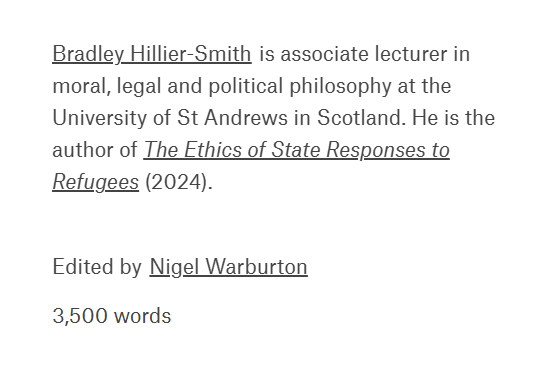Moral refuge
 You can believe in border control yet protect those fleeing to safety. So what is our ethical obligation to refugees?
https://aeon.co/essays/a-philosophical-view-of-our-ethical-obligations-to-refugees
You can believe in border control yet protect those fleeing to safety. So what is our ethical obligation to refugees?
https://aeon.co/essays/a-philosophical-view-of-our-ethical-obligations-to-refugees
 Sudanese refugees at a water distribution point in Adre refugee camp, home to more than 150,000 people who have fled the war in Sudan. Photo by Ivor Prickett/Panos Pictures
Sudanese refugees at a water distribution point in Adre refugee camp, home to more than 150,000 people who have fled the war in Sudan. Photo by Ivor Prickett/Panos Pictures

There are currently 43.7 million refugees worldwide. These are people who have been forced to flee their home countries due to severe threats to their lives, human rights and basic needs. Yet, having fled in search of safety, they have not always found it. Instead, the vast majority live in squalid and dangerous camps or face destitution in urban areas in regions neighbouring their own states in the Global South. In these conditions, refugees continue to face severe human rights violations. A small minority undertake perilous journeys to find adequate safety in the Global North. Thousands lose their lives on the way, every year.
How should states in the Global North respond to this situation? This question polarises debate. Some philosophers, like Peter Singer, argue that states must admit refugees until the point of societal collapse; others
argue that states are not necessarily obligated to admit a single refugee. Some politicians advocate for expansive resettlement, others seek to prevent refugees from seeking asylum at the border, or even deport them. Some citizens march the streets proclaiming ‘refugees welcome here’, others attempt to burn down a hotel with refugees inside. Some states have welcomed more than a million refugees, others build concrete walls and barbed wire fences. In the face of such volatile disagreement, there is an urgent need for an understanding and agreement on what an
ethical response to refugees would be.
To achieve this agreement, we must reach across divides in current debates to find common ground and base our approach on widely shared commitments. In this spirit, we can grant that states have a right to control their borders and immigration. The question of obligations to refugees is often tangled up with questions of whether states have a right to control borders. But these are distinct questions. You can believe that states have a right to control borders and immigration, yet still agree that states have obligations to protect refugees. So, we can move past the broader distracting and volatile debate on immigration, and focus on obligations to refugees specifically.

Refugees are migrants, but only insofar as they have fled their own countries. The
majority migrate no further. Refugees are distinct, as
recognised in international law, because they have been forced to flee their own states due to severe threats. Their own state is unwilling or unable to adequately protect them, so they are forced to seek safety elsewhere. This distinguishes refugees from migrants who may not be forcibly displaced and unable to return, but who migrate for other reasons. Refugees therefore have particularly urgent claims to protection and potential admission.
snip



